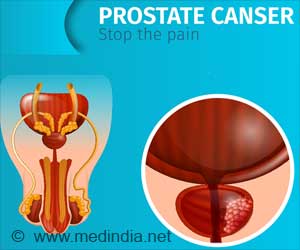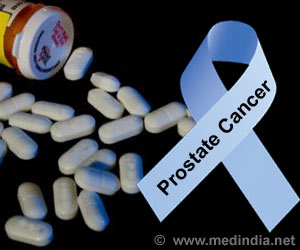
VEGF, or vascular endothelial growth factor, induces blood vessel growth, a process known as angiogenesis, which is a key element in solid tumor growth and metastasis. It is overexpressed, along with its receptors, in various cancers, including breast, renal cell carcinoma and gliomas, and has been shown to help predict response to certain drugs.
However, conflicting data in the literature has left the role of VEGF in prostate cancer as a useful biomarker unclear and controversial.
Here, in one of the largest studies of VEGF expression in prostate cancer, senior author Adam P. Dicker, MD, PhD, Chair of the Department of Radiation Oncology at Jefferson, and colleagues retrospectively analyzed data from two groups of men with locally advanced prostate cancer: those who had only radiation therapy and those who had short-term neoadjuvant and concurrent androgen deprivation therapy and radiation therapy.
Data was collected using pathologic material of over 100 men from the Radiation Therapy Oncology Group 8610 phase III randomized control trial to explore VEGF's potential as a biomarker, one that could be used to improve the treatment of prostate cancer patients through better targeted therapies.
Based on the results, however, researchers posit that the VEGF protein may not be a relevant biomarker for this patient group.They found no statistically significant difference in pre-treatment characteristics among men with varying VEGF levels and no correlation between VEGF expression and overall survival, distant metastasis, local progression, disease-free survival, or biochemical failure.
Advertisement
"VEGF in this disease does not have a driver role," said Dr. Dicker. "The clinical trials using VEGF inhibitors did not have clinical benefit, so this study confirms that this is not a path forward to tacking this disease."
Advertisement
"This study is among the larger studies of VEGF expression in prostate cancer, and we urge the research community to avoid the misrepresentation of the literature with a lack of publication of even well-designed large negative studies, a publication bias against negative trials, as the current literature in this area appears to be predominated by only small exploratory positive trials, with a lack of subsequent confirmation with larger, longer prospectively designed trials," the authors write.
Other institutions included Prince Edward Island Cancer Treatment Centre, University of Pennsylvania, Abington Hospital, University of California, San Francisco, Melre M. Mahr Cancer Center, University of Miami, and the Intermountain Medical Center.
Source-Eurekalert














